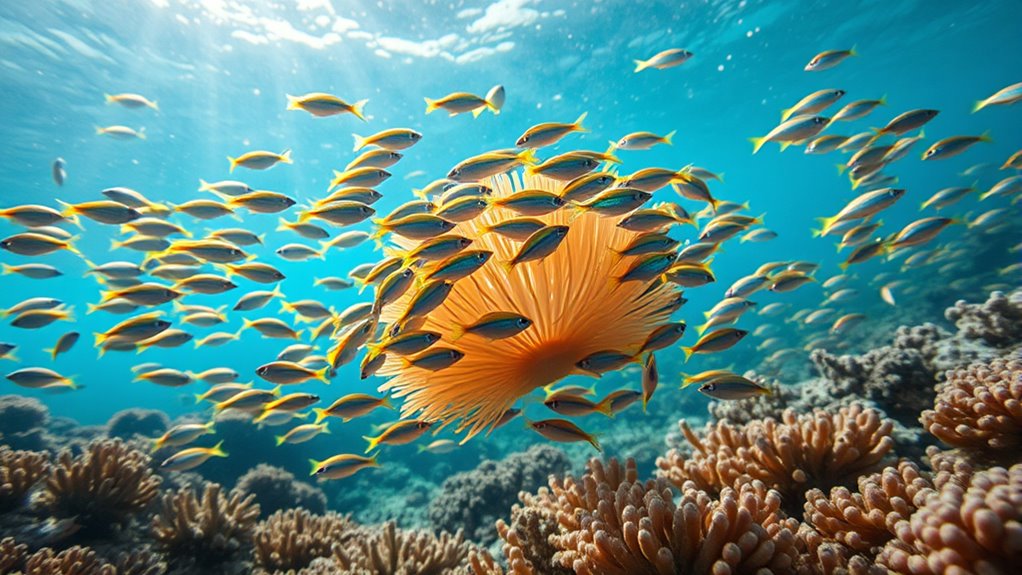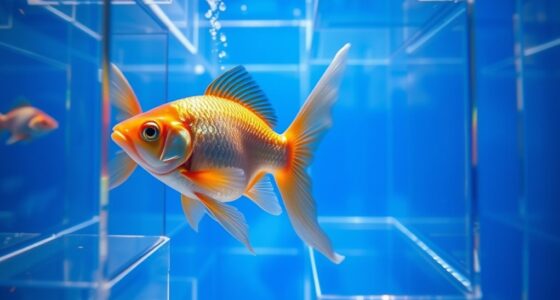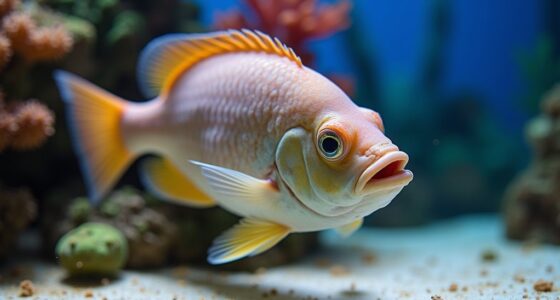Recent underwater research shows that fish can actually feel ticklish, revealing they have more complex senses than we used to think. When gentle touches or vibrations occur, fish respond with specific behaviors that resemble human reactions to tickling. This indicates their sensory systems include detecting subtle stimuli, supporting social interactions like bonding and communication. If you’re curious about how fish’s feelings influence their behavior and relationships, there’s much more to uncover below the surface.
Key Takeaways
- Fish can perceive gentle touches and vibrations, indicating they can feel ticklish sensations underwater.
- Recent research shows fish respond to light touches with specific behaviors, suggesting tactile perception.
- Fish’s advanced sensory systems enable them to detect subtle stimuli, including tactile and vibrational cues.
- Tactile responses may serve social functions like bonding, similar to human physical interactions.
- These findings challenge previous beliefs, proving fish possess complex sensory and perceptual abilities.

Recent underwater research has revealed that fish can feel ticklish, challenging long-held beliefs about their sensory capabilities. This discovery opens new doors to understanding how fish perceive their environment and communicate with each other. You might have thought fish only relied on basic senses like sight and smell, but it turns out their aquatic sensation is far more complex. Fish communication isn’t just about visual cues or chemical signals; it involves subtle tactile responses that suggest they can experience something akin to ticklishness. This sensation might serve as a way for fish to gauge their surroundings or interact with others in a more nuanced manner than previously thought.
Recent research shows fish can feel ticklish, revealing a complex sensory world underwater.
The study involved observing fish reactions to gentle touches and vibrations, which they responded to with movements and behaviors that resemble human responses to tickling. These responses indicate that fish possess a level of sensory perception that allows them to detect and react to light, fleeting contact, or even minor changes in water currents. As you consider this, it’s clear that aquatic sensation isn’t limited to just detecting pressure or movement; it also encompasses more refined, tactile experiences that influence how fish communicate and establish social bonds. For example, when fish are touched in specific ways, they may interpret it as a form of social interaction, much like a handshake or a pat in human communication. Additionally, this ability to feel ticklish may enhance their capacity for social bonding, fostering stronger group cohesion.
The notion that fish feel ticklish also suggests that their nervous systems are more sophisticated than previously assumed. This means their sensory receptors are capable of detecting subtle stimuli, and their brains can process these signals in ways that prompt specific behaviors. When you think about fish communicating, it’s not just through visual displays or chemical messages but also through physical contact and sensation. These tactile signals could be vital during mating rituals, territorial disputes, or social bonding, providing a richer layer of interaction that enhances their survival and cohesion within groups.
Understanding this aspect of aquatic sensation also helps scientists appreciate how complex fish behavior truly is. It isn’t just about basic survival instincts; it involves a dynamic network of sensory inputs that influence how fish behave and relate to each other. As you learn more about these findings, it becomes clear that fish aren’t just passive creatures gliding through water—they’re actively sensing, feeling, and communicating in ways that mirror some human experiences. This research not only reshapes our view of fish intelligence but also highlights the intricate ways aquatic life perceives its world, emphasizing that even underwater, sensation and communication are deeply intertwined.
Frequently Asked Questions
Do All Fish Species Respond to Tickling Similarly?
You might wonder if all fish respond to tickling the same way. In reality, species-specific responses vary greatly due to behavioral differences. Some fish might show curiosity or playful behavior, while others remain indifferent or stressed. These behavioral variations depend on their environment, species traits, and individual personalities. So, not all fish respond similarly to tickling; their reactions are unique, highlighting the fascinating diversity within aquatic life.
How Do Researchers Ensure Fish Aren’t Stressed During Experiments?
Imagine you’re in a delicate dance with nature—researchers do too. They carefully monitor fish stress levels, using gentle methods and minimal handling, ensuring ethical considerations are met. By observing behavior and adjusting procedures, they prevent undue stress, respecting the fish’s well-being. This thoughtful approach keeps experiments humane and accurate, showing that caring for animal welfare isn’t just an option but a responsibility in scientific discovery.
Can Fish’s Ticklishness Be Used to Improve Their Welfare?
You can use fish’s ticklishness to enhance their welfare through behavioral enrichment and sensory stimulation. By understanding that fish respond positively to gentle touch or varied environments, you can create activities that keep them mentally engaged. This not only reduces stress but also promotes natural behaviors. Incorporating sensory stimulation based on their ticklish responses helps improve their quality of life, making their environment more stimulating and less stressful.
Are There Any Implications for Fish-Human Interactions From This Study?
Think of this study as a mirror reflecting our responsibility. It suggests that fish may experience sensations like ticklishness, which raises ethical considerations for how you treat them. You should be mindful of your impact, fostering compassionate interactions. This awareness can strengthen conservation efforts by emphasizing fish sentience, encouraging more humane practices. Recognizing their capacity for sensation inspires you to act more ethically and support efforts that protect their well-being.
What Other Animals Might Experience Similar Sensations Underwater?
You might wonder if other animals experience sensations like ticklishness underwater. Marine mammals, such as dolphins and whales, could feel similar stimuli because of their complex nervous systems. Aquatic invertebrates, like octopuses and crustaceans, might also have some capacity for sensation, though their nervous systems differ. Exploring these possibilities helps you understand the diverse ways underwater creatures perceive their environment, revealing a fascinating range of sensory experiences.
Conclusion
Now, imagine the ocean’s depths as a mirror reflecting your own hidden feelings. Just as fish respond to tickles, it reminds you that even in silence, there’s a world full of sensation and connection. This study shows that beings often misunderstood are more aware than we realize, much like a secret wave whispering truths beneath the surface. So, next time you plunge into the water, remember—you’re sharing the same universe of feeling, waiting to be explored.










